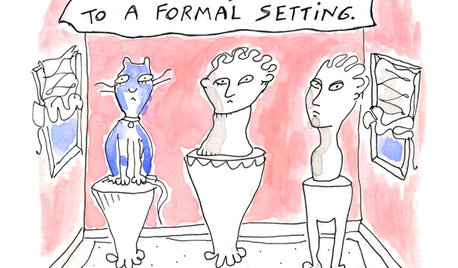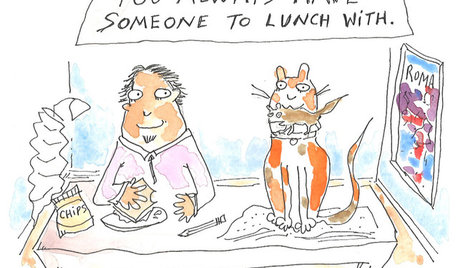Does spaying/neutering change a purr?
alisande
12 years ago
Related Stories

PETSIncredible Home Catwalks Make for Purr-fectly Happy Felines
Walkways and tunnels custom built to the tune of about $35,000 keep a homeowner’s 18 cats on cloud nine
Full Story
PETSSo You Want to Get a Cat
If you're a cat lover, the joys outweigh any other issue. If you haven't lived with one yet, here are a few things to know
Full Story
MOST POPULAR7 Ways Cats Help You Decorate
Furry felines add to our decor in so many ways. These just scratch the surface
Full Story
FUN HOUZZ6 Reasons Every House Needs a Cat
Everyone should have a feline fixture as part of their home decor. Here's why
Full Story
PETSSee a Deluxe 'Catio' Built for Feline Fun
Sixteen lucky cats get the run of a protected outdoor patio with ramps, steps and even a koi pond
Full Story
THE HARDWORKING HOMEA Laundry Makes Room for a Diva Cat
A South Carolina laundry room was designed to be sophisticated and functional, but when a kitten arrived, whimsy emerged
Full Story
PETS10 Tips for Keeping Indoor Cats Healthy and Happy
It's National Cat Day: Ask not what your cat can do for you (because it will ignore you) but what you can do for your cat
Full Story
PETSHouzz Pets Survey: Who Rules the House — Dogs or Cats?
New data shows that pets make people happy, and pet owners love spending big to return the favor
Full Story
FEEL-GOOD HOME6 Design Ideas for Happy Pets
Keep your dog or cat feeling safe and in high spirits, and you'll all feel more at peace. Here's how
Full Story
OUTDOOR PROJECTSBring In the Birds With a Homemade Bubble Rock
An avian expert from Southern Indiana shows how to make a burbling fountain that migrating birds will love
Full Story







dlchase6630
3katz4me
Related Professionals
American Fork Architects & Building Designers · Aspen Hill Interior Designers & Decorators · East Hanover Interior Designers & Decorators · Scottsdale Furniture & Accessories · Moraga Furniture & Accessories · Urbandale Furniture & Accessories · Crestview Cabinets & Cabinetry · South Riding Cabinets & Cabinetry · Cutlerville Flooring Contractors · Eustis Flooring Contractors · Johnson City Flooring Contractors · Kansas City Flooring Contractors · Mountain Top Flooring Contractors · Seekonk Flooring Contractors · Alum Rock Flooring Contractorscat_mom
ritaweeda
alisandeOriginal Author
cocontom
lzrddr
ritaweeda
Jessica Lange